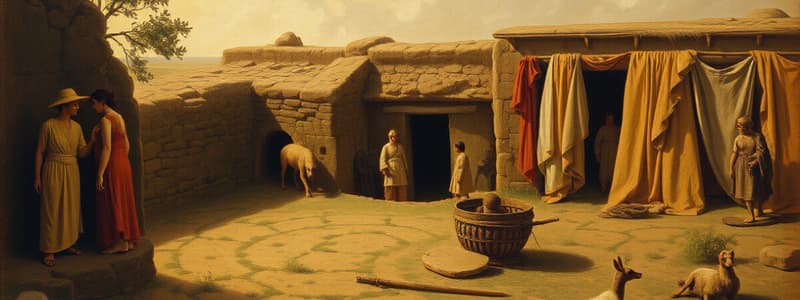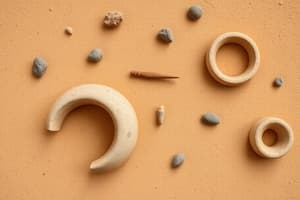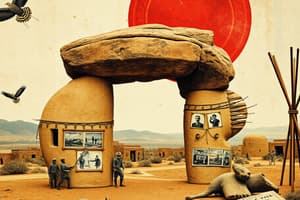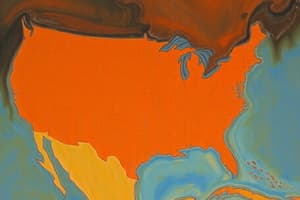Podcast
Questions and Answers
What motivated Edgar B. Howard to travel to New Mexico in 1932?
What motivated Edgar B. Howard to travel to New Mexico in 1932?
- To investigate a find of ancient bones (correct)
- To participate in a competitive excavation
- To study the local wildlife
- To conduct general archaeological research
Clovis points have been found in numerous locations throughout South America.
Clovis points have been found in numerous locations throughout South America.
True (A)
What are the slender spear points that Edgar B. Howard discovered called?
What are the slender spear points that Edgar B. Howard discovered called?
Clovis points
The oldest securely dated Clovis points were discovered in ______.
The oldest securely dated Clovis points were discovered in ______.
Match the following materials with their corresponding use in making Clovis points:
Match the following materials with their corresponding use in making Clovis points:
Which of the following describes Clovis points?
Which of the following describes Clovis points?
Edgar B. Howard was associated with the University of New Mexico during his archaeological work.
Edgar B. Howard was associated with the University of New Mexico during his archaeological work.
What challenges exist in dating stone objects like Clovis points?
What challenges exist in dating stone objects like Clovis points?
What do Clovis points signify about early societies in the Americas?
What do Clovis points signify about early societies in the Americas?
All researchers agree that the Clovis culture was the first and only culture in the Americas.
All researchers agree that the Clovis culture was the first and only culture in the Americas.
What was the primary use of Clovis points initially thought to be?
What was the primary use of Clovis points initially thought to be?
Clovis points were part of a generalized tool kit known as the __________ of the ancient world.
Clovis points were part of a generalized tool kit known as the __________ of the ancient world.
Match the archaeological evidence with its significance:
Match the archaeological evidence with its significance:
What was a significant change regarding the Clovis culture as researched by Donald Grayson and David Meltzer?
What was a significant change regarding the Clovis culture as researched by Donald Grayson and David Meltzer?
Clovis points disappeared after three or four centuries of use.
Clovis points disappeared after three or four centuries of use.
What ecological factor contributed to the split of the Clovis culture into separate groups?
What ecological factor contributed to the split of the Clovis culture into separate groups?
Charles C. Mann describes the comprehensive history of the Americas dating back at least __________ years.
Charles C. Mann describes the comprehensive history of the Americas dating back at least __________ years.
What is a key takeaway from the study of the Clovis culture according to Charles C. Mann?
What is a key takeaway from the study of the Clovis culture according to Charles C. Mann?
Flashcards are hidden until you start studying
Study Notes
Edgar B. Howard and the Clovis Discovery
- Edgar B. Howard was an archaeology research associate at the University of Pennsylvania Museum in November 1932.
- He traveled to eastern New Mexico after learning about a cache of ancient bones discovered by a road crew.
- Howard excavated a site in Clovis, uncovering mammoth bones and slender spear points known as Clovis points.
Characteristics of Clovis Points
- Clovis points are distinctive spear points made from jasper, chert, and obsidian.
- They feature a lance-shaped tip with sharp edges and shallow concave grooves called “flutes” for shaft insertion.
- Typical size is about four inches long and one-third of an inch thick, often exhibiting beautiful craftsmanship.
Cultural Significance and Distribution
- Over 10,000 Clovis points have been found across 1,500 locations in North America, with some as far south as Venezuela.
- The oldest securely dated Clovis points date back 13,500 years, found in Texas.
- Clovis points rapidly proliferated, appearing from Florida to Montana within a few centuries.
- Archaeologists speculate that the swift spread indicates a single way of life, known as the Clovis culture.
Debate Over Cultural Origins
- Initial thought placed Clovis culture as the earliest American culture; however, subsequent evidence suggested pre-Clovis settlements in Chile and Oregon.
- Pre-Clovis evidence includes fossilized human excrement, indicating earlier human habitation in the Americas.
Hunting and Subsistence Patterns
- Clovis culture was initially believed to focus on hunting megafauna like mammoths and saber-toothed tigers.
- Recent studies show that evidence of large-game hunting is scarce, with only 14 out of numerous Clovis sites showing solid evidence.
- Clovis people likely relied more on foraging, hunting small mammals, and fishing, using a generalized tool kit that included Clovis points.
Cultural Evolution and Legacy
- Clovis points were used for approximately three to four centuries before the culture disappeared.
- As Clovis groups adapted to different ecological zones, cultural diversity emerged over the next 10,000 years.
- The physical remnants of Clovis culture include tools like the Clovis points, which remain the clearest markers of America's first extensive cultural presence.
Historical Perspective
- Charles C. Mann emphasizes the importance of recognizing the Americas' rich history that predates Columbus, marking the first fabrication of stone tools by Clovis people.
- Understanding this history contributes to a broader narrative of human civilization.
Studying That Suits You
Use AI to generate personalized quizzes and flashcards to suit your learning preferences.



